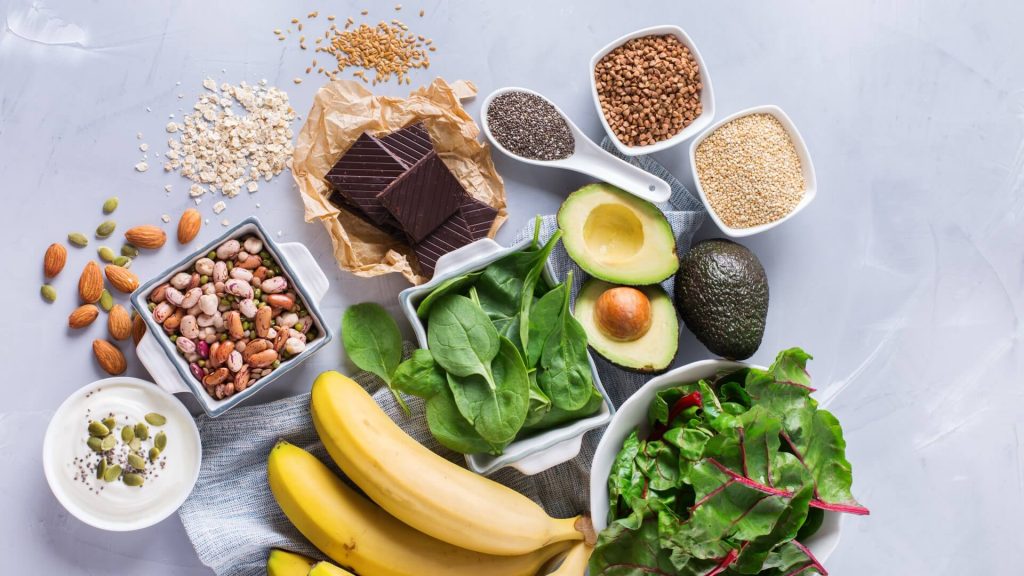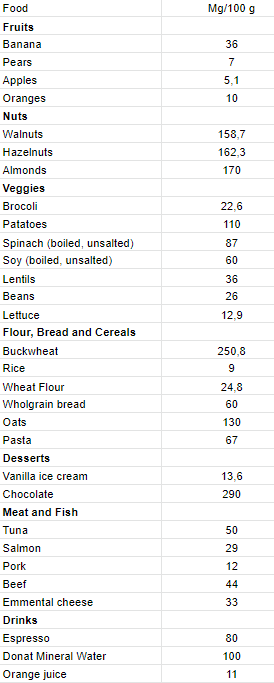If someone asked you about the chemical symbol for magnesium, you’d probably know the answer straight away – even if you didn’t listen much during chemistry lessons. But despite the fact that this vitally important mineral is so well known, most people have no idea about how much our health and wellbeing depend on it. Did you know that magnesium takes part in more than 300 biochemical processes in our bodies? If you’re surprised, read on!
In this article, we’ll explore the fascinating world of this amazing mineral. We’ll discover the amazing health benefits of magnesium and set out to find some magnesium-rich foods.

Basics First: What Is Magnesium?
Magnesium is a lightweight metal, normally light grey in colour. It belongs to the most abundant elements in the universe. We can find it in all types of cells, in the Earth’s crust as well as in the ocean. Every organism out there needs the right amount of magnesium in the system to function properly while in plants, it’s vital for photosynthesis, e.g. producing oxygen and thus enabling us to breathe.
And if you, by any chance, belong to those who actually like chemistry, you’ll surely remember that magnesium is an alkaline earth metal, which is also true for another very well-known chemical element – calcium, another vitally important element.
Magnesium is one of the most abundant minerals on Earth and vitally important for all living creatures.
Magnesium is the fourth most abundant mineral in the human body and one of the most important ones. It plays a vital role in energy metabolism and blood pressure regulation while being essential for healthy bones, proper muscle function, speedy digestion and a healthy heartbeat.
But despite these obvious health benefits of magnesium, studies show that more than a half of people across North America and Europe don’t meet the recommended daily intake. The reason often lies in our relentlessly fast lifestyle that takes a toll on our diet.
This is the reason we need to dig deeper into the question of why magnesium is so vital to our wellbeing and how to make sure magnesium rich foods become a regular part of our diet. Let’s go!
Why Our Bodies Need Magnesium?
A healthy magnesium intake is vital to our bodies as this mineral is of key importance for the activation of enzymes that bring about a plethora of biochemical reactions in our organism. The human body contains approximately 25g of magnesium, of which 60% is in the bones while the rest is in the muscles, soft tissues and liquids such as blood.
So, which processes does magnesium help to regulate?
- Turning food into energy. Magnesium activates chemical reactions that are vital for turning glucose into energy. This is especially important for athletes and everyone with an active lifestyle. Insufficient levels of magnesium can quickly cause muscle cramps or lead to post-workout pain and tightness.
- Protein synthesis. Magnesium is involved in the synthesis of proteins in our organisms.
- Magnesium for muscles. Magnesium is crucial for proper muscle function, a task it performs in combination with calcium. While calcium activates the muscles, thus causing them to contract, the role of magnesium is to relax the muscles back. If there isn’t enough magnesium in our system to counterbalance the effect of calcium, muscle cramps will kick in. Additionally, muscle fibres are also more prone to injury in this state. This is why you will see athletes take magnesium for muscle pain after an excruciating training session.
- Regulating your heartbeat. Magnesium is also tasked with taking care of the most important muscle in your body. Just like in the case of other muscles, it counters the effect of calcium, thus making sure the muscle fibres can relax after each contraction. Too little magnesium can therefore lead to your heart beating faster than normal or even to irregular heartbeat, which can seriously threaten your health. A healthy magnesium level also keeps your cardiovascular system in tiptop shape by relaxing the walls of your veins, thus regulating your blood pressure and lowering your risk of heart-attack.
- A healthy nervous system. Magnesium also plays a crucial role in transmitting signals between the brain and other parts of the body. It prevents the overstimulation of nerve cells, which can actually damage or even kill them. This way, it prevents brain damage and helps our minds to stay sharp.
- Cell reproduction and regeneration. Magnesium contributes to normal cell growth and reproduction, thus playing a role in cancer prevention.
- Electrolyte balance. Magnesium ensures the balance of electrolytes in our bodies. These regulate the amount of water in the organism as well as ensuring its growth and reproduction. Additionally, they play a role in crucial processes within our cells and help transmit nerve impulses.
Strong bones and healthy teeth. Together with calcium, magnesium is vital for ensuring a healthy bone and teeth structure. By keeping our bone density in check, it prevents bone fractures. - Regulating blood sugar. According to newer studies, magnesium is also beneficial for people with type II diabetes as it helps the cells to use the insulin in the system more efficiently.
- Improving your sleep. Magnesium stimulates the production of a neurotransmitter that helps our body to relax during sleep. This way, it prevents us from waking up at night, improving our sleep quality.
- Mental health. As magnesium helps to keep our brain in shape, it can also protect you from depression or, as some studies suggest, helps to treat its symptoms. .

Our Digestion also Loves Magnesium
Did you we were through with listing all the health benefits of magnesium? Think again! Besides all the vital processes in our body in which this mineral plays at least a side role, we can’t overlook its involvement in a healthy and regular digestion.
As already mentioned, magnesium relaxes our muscles, which is crucial for getting the food waste through the bowels and out of the body. By relaxing the muscles of the gastrointestinal tract, it stimulates its rhythmic contractions, thus ensuring that the waste finds its way out faster and preventing slow digestion or even constipation.
However, if you are already fighting a tough battle with constipation, make sure you also read our article on The best ways to deal with constipation. Don’t forget to also read the tips for overcoming slow digestion.

It’s Time for Magnesium-Rich Foods!
Now that we know the health benefits of magnesium, we need to talk business – how to get it in our system. Which foods are rich in magnesium, how much of it do they contain? What should we eat and how much? Let’s not rush things and first dig into the question of how much magnesium we actually need on a daily basis.
The recommended daily intake of magnesium depends on many factors, such as age, gender, weight, level of physical activity and the amount of alcohol one drinks.
In general, the recommended dietary intake guidelines for magnesium range between 200 and 400 mg daily for females and between 300 and 500 mg daily for males. Some experts even suggest that one should multiply their body weight by 6 and get the recommended amount in milligrams. Experts also warn that most people almost never actually meet the above requirements (missing them by a small margin), which additionally emphasizes the importance of magnesium-rich foods.
Following the dietary recommendations is especially important for children in development as well as for pregnant women. On the other hand, athletes after a long training session might need an even higher amount of this vital mineral, which is also true for people suffering from stress, diarrhea or vomiting as well as diabetes patients. Due to their illness, they lose excess amounts of magnesium and therefore need to replenish their stocks.
The recommended daily amount of magnesium depends on many factors, such as age, physical activity or health condition.
Ok, let’s now take a look at how we can meet our magnesium intake requirements.
- Magnesium-rich foods. As the title of this article suggests, this is the best way to get the amount of magnesium our bodies need to function properly. This is why we’ve also prepared a list of foods high in magnesium and are a great solution for all those who can’t get enough of it.
- Magnesium in water. What we have in mind, of course, is natural mineral water, which is enriched with crucial minerals and sulfates that keep you healthy while also speeding up your digestion. A brilliant example of such a product is Donat natural mineral water, which is clinically proven to treat constipation.
- Magnesium supplements. You can get them in pharmacies or grocery stores. Among the most popular ones are the effervescent tablets or magnesium powder. These can be a vital source of energy for the most active among us as these will probably not be able to cover all of their magnesium needs through their diet alone.
So, What Foods Are Rich in Magnesium?
We can cover most of our daily magnesium needs with the help of a proper diet. Even the smallest changes to our daily menus can bring about a big difference in how much vital minerals we get each day, thus thoroughly improving our wellbeing. Therefore, it’s important to plan our diet with the following question in mind: what foods are rich in magnesium.
Luckily for us, magnesium is present in many foods that we can buy in our local grocery store – right now! Among awesome sources of this mineral are nuts, pumpkin seeds, legumes (some contain 10 times more magnesium than meat products!), whole grain products, leafy greens and good old potatoes. A little lower percentages of magnesium can also be found in fruits, such as bananas and oranges, as well as in milk, eggs, coffee and tea.
In general, the best sources of magnesium are foods that contain the highest amount of chlorophyll, a green pigment produced in plants. Spinach, chard and cabbage are amazing examples of such veggies. Experts also recommend foods that are high in fibre while vegetables are generally higher in magnesium than fruits.
But before we continue, a word of warning. When boiling foods high in magnesium, their mineral content will be significantly lower. Along with other minerals, magnesium leaches out of your favourite veggies and is lost in the boiling water. The mineral content in vegetables can also be lowered due to extensive fertilisation. It also goes without mentioning that patients with digestion issues and especially those with type II diabetes will have a harder time absorbing the magnesium from the foods they eat.

Legumes and leafy greens are an incredible source of magnesium.
So, have we managed to convince you to opt for more magnesium-rich foods? Great! To make your job a bit easier, we’ve already gone ahead and prepared a chart that will make your transition smoother. To see what foods are high in magnesium and should end on your plate more often, simply scroll down and find your favourites.
The magnesium foods chart will help you to plan your meals more efficiently and make sure you reach your daily allowance with ease. Go ahead and take a look.
Magnesium-Rich Foods Chart:

Natural Mineral Water – Another Magnesium Treasure!
Ok, we’re done with magnesium rich-foods, not it’s time to also discuss drinks! And if there’s one worthy of our attention, it’s water. Even the humble tap water can cover around 10% of your daily magnesium needs, but if you’re up for the real deal, natural mineral water is what you want.
But not just any mineral water. What we have in mind is a natural mineral water with a high magnesium content, like Donat. Among other significant health benefits, its unique combination of magnesium and sulphate ions will enable your gastrointestinal tract to work with full efficiency.
The key of Donat’s success is in its effect on the bowels. Magnesium and sulphate ions increase the volume of the intestinal walls by up to five times, thus creating enough pressure to get things moving.
By drinking natural mineral water, we can meet the recommended magnesium intake.
And this is not all! We bet you didn’t know that that one liter of Donat contains a whopping 1000 mg of magnesium. This means that by drinking approximately two large glasses of Donat every day, you can easily meet your daily intake needs – even if you miss the mark with magnesium-rich foods! How awesome is that?
Magnesium deficiency is an enemy worth fighting
Haven’t slept well in a while? Do you lack energy while even your favourite dish can’t lift your spirits? It’s possible that you are showing the first signs of magnesium deficiency. While there’s no reason to rush to the nearest hospital, you shouldn’t ignore the issue completely. Experts warn that whereas clinical levels of magnesium deficiency are very rare, milder cases are a lot more widespread. But even missing the requirements by a small margin can negatively affect your health, which is why you should be careful about it.
And which are the most common magnesium deficiency symptoms? Among the most obvious ones are muscle cramps, irregular heartbeat, lack of appetite and a weakened immune system. In the long run, magnesium deficiency can also heighten the risk of heart attack and lower your calcium and potassium levels.
When the magnesium level is a bit low, the body will first go for the reserves in our body, but when this is not enough, magnesium deficiency symptoms will kick in:
- dizziness,
- sleepiness,
- Lower levels concentracion,
- migraines and headaches,
- cramps in leg, neck and back muscles – also possible along the spine, around the stomach area and in the feet,
- a burning or tingling sensation on the skin,
- depression,
- heart issues and
- high blood pressure.
Among those that are especially prone to magnesium deficiency are children, pregnant women and all those who are more physically active, such as athletes. We also can’t forget about the elderly, whose bodies aren’t able to absorb as much magnesium as younger individuals while they also lose more magnesium through the kidneys.
Magnesium deficiency can also be a consequence of certain diseases or digestion issues such as vomiting and diarrhea. Those at risk also include patients with diabetes or thyroid gland issues as well as people who drink too much alcohol.

Wondering How to Correct Magnesium Deficiency?
If you would like to replenish magnesium stocks to feel better and more energised, you’re probably asking yourself what’s the best way to go about it. You can stick to magnesium-rich foods from the chart above, indulge in the sparkling treasure that is Donat or go for some supplements. Hate several possibilities? Let’s take a look at how to correct magnesium deficiency based on your needs.
Generally, your magnesium needs can easily be covered by a wise choice of foods and drinks, even completely without supplements. But as you know, there are exceptions to every rule out there. And our bodies might occasionally need more magnesium than normally.
If sports activities are your thing and if you like the all-in approach when exercising, your body will probably crave more magnesium. And you should always make sure it gets it! Your first step in correcting a mild magnesium deficiency can be resorting to the natural mineral water, along with foods high in magnesium. And if you still feel the cramps, make supplements your best friends. Buy some effervescent tablets or powder and charge your system up. Athletes will almost always need to resort to this option.
Can You Overdose on Magnesium?
Well, we don’t blame you if this question came to your mind while reading this article. If, for example, you take many magnesium supplements every day, can you actually overdose on magnesium? Let’s take a look!
The maximum limit for a daily magnesium intake isn’t strictly determined as experts don’t see the need to set it. The reason is simple – excessive amounts simply get flushed out of our system in the urine. While possible, magnesium overdose is quite an achievement.
But don’t take this for granted and stack up with magnesium supplements without thinking about the consequences. It’s still possible to overdo it. Common magnesium overdose symptoms include an increased blood pressure and faster heartbeat while you can also feel nauseous and suffer from diarrhea. And if you have kidney issues, be even more careful!
Where Does This Leave Us?
Magnesium is vital for a multitude of biochemical processes in the human organism, which makes it crucial for our overall health and wellbeing. Although not many people suffer from severe magnesium deficiency, many do not eat enough magnesium-rich foods to make the daily requirements. To make sure you don’t become one of them, don’t forget to take another look at our magnesium-rich foods chart and raise a glass of mineral water with your loved ones. You’ll feel much better – this is a promise!
Frequently asked questions
1. Why does the body need magnesium?
Magnesium is essential for hundreds of biochemical processes in our body. Among other things, it is necessary for obtaining energy from food, creating proteins, proper muscle work, heart rate regulation, proper work of the nervous system, cell division and renewal, strong bones and teeth…
2. Why is magnesium important for digestion?
Magnesium relaxes the intestinal musculature and thereby accelerates the rhythmic movement of the intestines, thus facilitating the excretion of harmful substances from the body.
3. What should be the daily intake of magnesium?
An average recommended daily intake of magnesium is between 200 and 400 mg for women and around 300 to 500 for men.
4. How do we obtain magnesium?
Magnesium can be obtained from food, drink, or dietary supplements. Nuts, pumpkin seeds, legumes, and foods made from whole grains, leafy vegetables, and good old potatoes stand out among the foods that contain magnesium. Smaller amounts are also found in bananas, oranges, meat, milk, eggs, coffee, and even tea.
5. Is Donat a good source of magnesium?
Donat natural mineral water is an excellent source of magnesium. 1 liter of Donat contains as much as 1000 mg of magnesium, which means that if we drink about 4 deciliters a day, we can easily meet our daily needs for this mineral.
Choose chapter:





